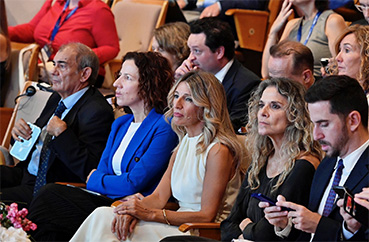Murcia (Spain) hosted, from September 15 to 19, the European Social Economy Week, an event whose central act was the European Social Economy Summit, held on the 17th with the presence of government representatives from 27 countries; members of the European Parliament and the European Economic and Social Committee, as well as senior representatives of the European Commission, led by Executive Vice-President and Commissioner for Social Rights, Skills and Quality Jobs, Roxana Mînzatu.
The Summit brought together more than 600 participants, including 100 international speakers and representatives of 200 organizations, to advocate for and ensure the full implementation of the European Social Economy Action Plan, and to integrate this business model into the new EU Multiannual Financial Framework (2028-2034).
The event concluded with Commissioner Mînzatu reaffirming the Commission’s key commitments to strengthening the Social Economy and recognizing its strategic value for cohesion and resilience across Europe: “You have my full commitment that I will work with you to continue advancing the ambitions of the Social Economy,” she stated.
In her speech, Mînzatu outlined some of the main areas of work she will focus on, ranging from strengthening the Action Plan with new measures; ensuring that the Social Economy gains weight in public procurement and in EU State Aid rules, as well as setting up mechanisms to improve access to finance for this business model.
She stated that the Social Economy “needs to be much larger than it is today.” She positioned herself as an ally of this model and expressed her gratitude for the invitation, looking forward to working intensively on the policies mentioned.
The Social Economy as a solution to today’s challenges and for Europe’s strategic autonomy
For his part, Juan Antonio Pedreño, president of Social Economy Europe, assessed the Summit’s debates very positively: “this event demonstrates the firm commitment of all the institutions and governments present, and the consensus on the role of the Social Economy as a solution to today’s challenges and for Europe’s strategic autonomy.”
Pedreño stressed the need for the next Multiannual Financial Framework to prioritize resources for the sector and called for the Social Economy, under the leadership of the Commission, to be placed at the center of all European strategies.
“We are not asking for privileges, we are asking for coherence: that European funds are directed towards business models that combine competitiveness and solidarity, that generate stable employment and that, unlike others, never relocate,” Pedreño added.
European Parliament Social Economy Intergroup
During the week, a meeting of the Social Economy Intergroup was also held in Murcia, with the presence of co-chairs Maravillas Abadía and Irene Tinagli. In this regard, Maravillas Abadía, citing data from the most recent study by CIRIEC and Euricse for the European Commission, highlighted that “no one doubts anymore that the Social Economy is a key player in Europe. It is an engine of employment representing more than 4.3 million enterprises and entities, and 11.5 million direct jobs, which amounts to 6.3% of the employed population in Europe and a turnover exceeding one trillion euros.”
Abadía emphasized that “financing must be strengthened and highlighted as a priority in the next Multiannual Financial Framework. The Social Economy cannot be seen as a mere tool, but as a strategic lever for the future of the EU.”
Reactivation of the Luxembourg Committee
Another highlight of this Summit was the reactivation of the Monitoring Committee of the Luxembourg Declaration, which brought together government representatives from Belgium, Bulgaria, Slovakia, Slovenia, Spain, France, Ireland, Italy, Luxembourg, Poland, and the Czech Republic.
The meeting reaffirmed the countries’ commitment to defending and promoting the Social Economy. Furthermore, the Committee set itself the goal of becoming a much more active and dynamic instrument to defend the progress of countries and, above all, to make this business model more visible and foster its growth.
The extensive program of the European Social Economy Week included the Executive Committee of Social Economy Europe, the Board of Directors of CEPES, a reception at Murcia City Hall, the III European Social Economy Awards, and the Day of Social Enterprises. In addition, the IEMED, Mediterranean Institute of Social Economy, hosted two days of discussions bringing together representatives from 12 Southern Mediterranean countries. Finally, there was a meeting of the RESEES program (Reinforcing the capacity of regional social economy ecosystems and stakeholders), as well as a day dedicated to “Women in Business.”







